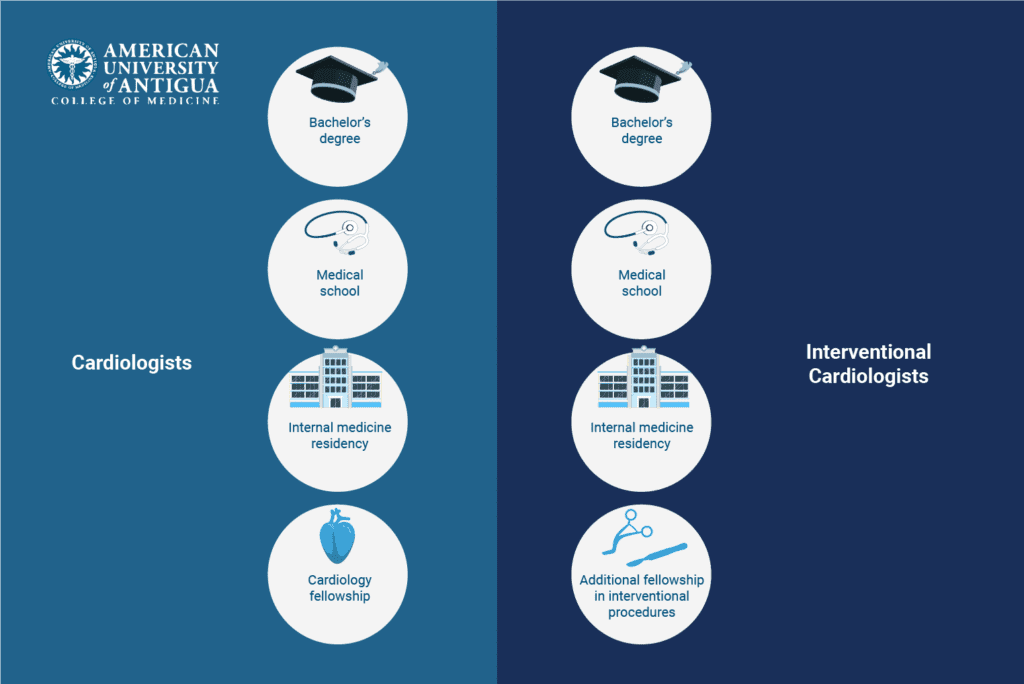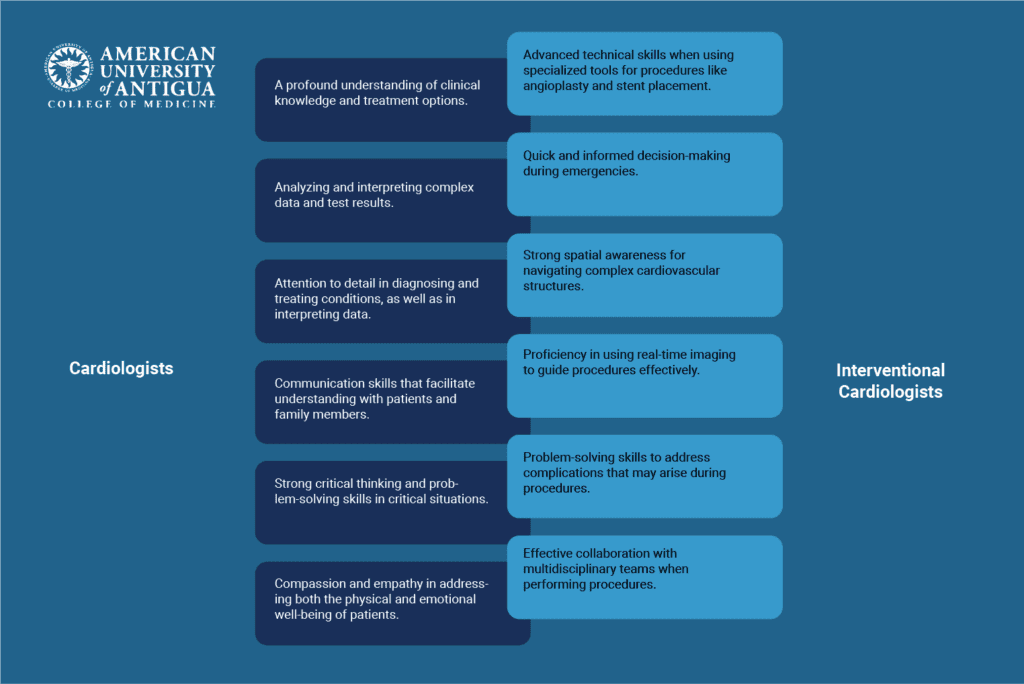How to Identify a Cardiologist vs. Interventional Cardiologist
- Roles: Cardiologists manage non-invasive treatments; interventional cardiologists perform minimally invasive procedures.
- Education: Both demand completing a bachelor’s degree, medical school, and residency; but each field requires different fellowships programs.
- Career outlook: Numerous job prospects with salaries around $372,000 for cardiologists and $400,000 for interventional cardiologists.
- Which path fits you best? Reflect on your preferences about patient care (cardiology) or life-saving, invasive procedures (interventional cardiology).
Cardiovascular or heart diseases have grown increasingly prevalent in recent years, impacting millions of people worldwide. Common heart conditions include coronary artery disease, arrhythmias, and heart failure. Factors such as genetics, poor diet, lack of exercise, high cholesterol, and smoking contribute to the problem, making it essential to address this growing health crisis.
Cardiologists and interventional cardiologists play an important role in preventing, diagnosing, treating, and managing heart diseases. Additionally, these specialists apply their skills and knowledge to improve patient health, save lives, and raise awareness about heart care. Therefore, cardiologists and interventional cardiologists are vital not only for treating heart conditions but also for encouraging preventive measures that help reduce the risk of complications.
✅ Request information on AUA's MD program TODAY!
YOUR PATH TO SUCCESS BEGINS HERE
This article defines the differences between cardiologists and interventional cardiologists and discusses their education, training, responsibilities, and key skills, offering guidance for those considering a career in these fields.
What Is a Cardiologist?
A cardiologist specializes in preventing, diagnosing, and treating heart and blood vessel diseases. These medical professionals treat a variety of conditions, including high blood pressure (hypertension), which can increase the risk of heart disease and stroke. They also manage arrhythmias, or abnormal heart rhythms, due to which palpitations or more serious complications can occur, and coronary heart disease, where blocked or narrowed arteries can cause chest pain and heart attacks.
Moreover, cardiologists manage heart failure, a condition in which the heart cannot pump blood effectively, resulting in fatigue, shortness of breath, and water retention (a buildup of fluids in the body). Their main duties include diagnostic testing, developing treatment plans, and performing interventions like angioplasty or heart surgery. While they play a key role in treating heart conditions, cardiologists typically do not perform surgeries, as their expertise lies in non-invasive procedures and medical management.
What Is an Interventional Cardiologist?
An interventional cardiologist, on the other hand, is a type of cardiologist who performs minimally invasive procedures to treat and manage complex heart conditions. Using catheter-based techniques, they insert thin, flexible tubes (catheters) through the blood vessels to diagnose and treat heart problems. Interventional cardiologists address congenital heart defects, such as holes in the heart or nontypical blood vessels that are present from birth, cardiovascular diseases, including heart attacks, etc.
Furthermore, they address structural heart conditions where the valves or walls of the heart do not function properly, disrupting the blood flow through the heart. Interventional cardiologists use advanced technology and techniques to offer effective treatments that improve patient outcomes without the need for major surgery.
What Is the Difference Between a Cardiologist and an Interventional Cardiologist?
While both cardiologists and interventional cardiologists work in the same medical niche, heart health, their approaches differ. Oftentimes, they even deal with similar issues, such as high blood pressure, heart disease, or other cardiovascular issues.
Nonetheless, their methods and focus differ. Cardiologists focus on non-invasive care using medications, diagnostic tests, and lifestyle management to address heart health. They focus on preventing and managing conditions through observation, medication, and ongoing monitoring. Interventional cardiologists, on the other hand, handle more complex issues through minimally invasive procedures, utilizing catheter-based techniques to treat conditions like heart attacks, coronary artery blockages, and structural heart problems.
Below, we will explore the differences between the two specialties, covering their educational and professional background, roles and responsibilities, and the key skills required in each field.
Education and training

Both cardiologists and interventional cardiologists start with a similar background in education: a bachelor’s degree in a science-related field, four years of medical school, and a three-year medical residency. Afterward, cardiologists typically complete a three-to-four-year fellowship which focuses on non-invasive methods and treatments for heart diseases. During this time, they learn to use stress tests or echocardiograms (echo) to assess and manage heart conditions. A number of cardiologists also pursue board certification to further enhance their qualifications.
On the contrary, interventional cardiologists undergo an additional one-to-two-year fellowship with a special focus on catheter-based procedures. Here, they learn about minimally invasive methods, such as stent placements or angioplasty, used to treat more complex heart conditions. Additionally, they receive emergency training, preparing them for time-sensitive interventions, such as those required during heart attacks. As a result, interventional cardiologists are uniquely qualified to perform procedures that cardiologists are not trained to conduct.
Roles and responsibilities
Both cardiologists and interventional cardiologists have specialized training in managing heart conditions, but their roles and responsibilities differ based on their focus areas. Cardiologists’ main responsibilities include:
- Diagnosing heart conditions: Using tests like EKGs, echocardiograms, and stress tests to diagnose heart problems;
- Managing chronic heart conditions: Prescribing medications and offering advice on lifestyle changes for optimal heart health;
- Preventing heart disease: Focusing on early detection and reducing heart disease risks;
- Rehabilitating cardiac patients: Supporting recovery after heart surgery or heart attacks.
Meanwhile, interventional cardiologists’ responsibilities include:
- Performing diagnostic catheterizations: Using catheters to assess blood vessels and detect blockages (blood clots);
- Conducting angioplasty and stent placement: Opening blocked arteries with balloon catheters and stents;
- Handling emergencies: Performing urgent interventions during heart attacks;
- Repairing heart valves: Repairing or replacing valves using minimally invasive techniques.
Key skills
Apart from their roles and responsibilities, cardiologists and interventional cardiologists must develop the necessary knowledge and skills to succeed in their fields. Below, you can find the key skills specific to each position.
Key skills for cardiologists include:
- A profound understanding of clinical knowledge and treatment options;
- Analyzing and interpreting complex data and test results;
- Attention to detail in diagnosing and treating conditions, as well as in interpreting data;
- Communication skills that facilitate understanding with patients and family members;
- Strong critical thinking and problem-solving skills in critical situations;
- Compassion and empathy in addressing both the physical and emotional well-being of patients.
Key skills for interventional cardiologists include:
- Advanced technical skills when using specialized tools for procedures like angioplasty and stent placement;
- Quick and informed decision-making during emergencies;
- Strong spatial awareness for navigating complex cardiovascular structures;
- Proficiency in using real-time imaging to guide procedures effectively;
- Problem-solving skills to address complications that may arise during procedures;
- Effective collaboration with multidisciplinary teams when performing procedures.

Career and Job Outlook
The demand for cardiologists and interventional cardiologists continues to rise, largely due to heart diseases being a major cause of death globally. A shortage of cardiologists is expected by 2034, according to the Association of American Medical Colleges (AAMC), creating a significant need for more specialists in the field.
Additionally, cardiologists and interventional cardiologists can benefit from several other job prospects. Apart from their practice in public or private settings, they can teach and conduct cardiovascular research in academia, or take on leadership positions within healthcare organizations.
Salaries are also expected to increase in the coming years. Currently, the annual salary of a cardiologist is $420,000, while that of an interventional cardiologist is around $372,000 per year.
Which Path Is Right for You?
When deciding which path you want to pursue, cardiology or interventional cardiology, it’s most important to align your decision with your personal interests and career goals. If you find advanced medical procedures fascinating and thrive in a fast-paced environment, interventional cardiology may be the right fit. This field creates opportunities to make a direct life-saving impact through minimally invasive procedures.
Alternatively, those who are more passionate about fostering long-term relationships with patients (through routine check-ups) and focusing on preventive heart care may easily fit in the cardiology field. This path provides a balanced approach, allowing you to engage in consultations, diagnostics, and treatment to improve heart health over time.
Conclusion
In conclusion, cardiologists and interventional cardiologists play significant roles in treating and managing heart health. Cardiologists employ non-invasive techniques to identify and treat heart problems, while interventional cardiologists deal with more serious heart conditions and complex procedures. Even though interventional cardiologists must undergo additional training for performing these advanced and complex procedures, both professions require extensive education and a deep commitment to patient care.
Additionally, both professions offer a wide range of career opportunities, attractive salary expectations, and the chance to make a significant difference in people’s well-being. The decision depends on your personal interests and goals — whether you imagine yourself working on preventive medicine and heart care or performing complex procedures.
Explore our medical school program here at the American University of Antigua College of Medicine and take the first step toward your medical career.
Frequently Asked Questions
What are the three types of cardiology?
Cardiology can be categorized into three types: invasive, non-invasive, and interventional.
Are interventional cardiologists considered surgeons?
Interventional cardiologists are not considered surgeons, although they perform procedures that resemble surgeries. While they perform complex procedures, these are done without the need for large incisions, making them different from traditional surgeries performed by cardiac surgeons.
✅ Request information on AUA's MD program TODAY!